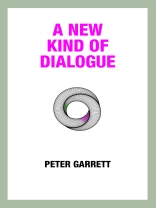A New Kind of Dialogue is a landmark in understanding the pervasive challenges of modern society.
It is a serious but easy read, written as a first-hand narrative that encourages dialogic thinking.
This is the story of how a new kind of Dialogue was conceived by the author and theoretical physicist David Bohm, and their eight years of participatory research until Bohm’s death in 1992. Their seminal paper, ‘Dialogue – A Proposal’, laid the foundation for the author’s 30 years of work introducing Dialogue into prison systems and consulting to multinational organisations.
Across the span of this remarkable journey, the author’s discoveries cover such diverse territory as . . .
Organisations. The author explores with compassion and insight the dynamic realities of these complex structures. Organisations are everywhere, and they struc- ture every part of our lives. But we are not running them – they are running us. We may be unaware of the cause, but we all experience the consequences that include social fragmentation and the proliferation of seemingly unresolvable problems.
Fragmentation of thought. It seems humans have changed little since Stone Age times, but our world has changed substantially. It is shaped by the way we now talk and think, that has become detached, fragmented and confused. The proposal that there is a single root cause is radical yet hugely encouraging. It is clear where to place our attention.
Dialogue as a profession. The author shows how one central way forward is the development of Professional Dialogue, which has proven itself to be effective and generative.
Cuprins
Foreword vii
Preamble xi
1 Origins in Africa 1
2 Out of Africa 13
3 Out of Society 25
4 Into Spirituality 33
5 Two Men About to Meet 44
6 A New Kind of Dialogue is Born 54
7 Immersed in Dialogue 65
8 Consolidation and Dissolution 73
9 Into Prison 90
10 Serving Time 106
11 Dialogue as a Cultural Intervention 126
12 Encountering Organisations 150
13 Running Businesses 162
14 Consulting to Organisations 172
15 Yet Another Reorganisation 188
16 Dialogue as a Mode 203
17 Dialogue as a Practice 232
18 Dialogue as a Process 257
19 Dialogue as a Systemic Architecture in Closed Systems 273
20 Dialogue as a Systemic Architecture in Open Systems 311
21 Dialogue as a Research Methodology 335
22 An Integrated Dialogue Model 360
23 Why Dialogue? 390
24 The Dialogic Intention 404
25 Affecting the Field 417
26 The Time Has Come 430
Acknowledgements 441












